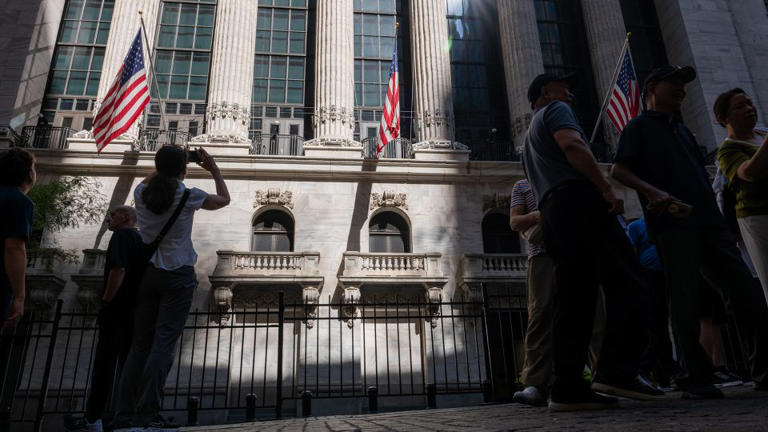This year has seen significant gains in the stock market, but the landscape may be shifting as political turmoil begins to impact investor sentiment. The S&P 500 has enjoyed a substantial rise of over 15% since January, maintaining a streak of 353 trading sessions without a 2% drop—the longest such period since the prelude to the 2007 financial crisis.
However, the stability of the U.S. stock market has been challenged this week. Investors are facing a confluence of destabilizing events: an assassination attempt on former President Donald Trump, increasing speculation that President Joe Biden might withdraw from the presidential race, bipartisan scrutiny and attacks on Big Tech and semiconductor companies, and a widespread global computer outage that has affected airports, banks, hospitals, and various other businesses.
On Friday, the Dow Jones Industrial Average fell by 378 points, or 0.9%, while the S&P 500 and the Nasdaq Composite dropped by 0.7% and 0.8%, respectively. This latest decline is part of a broader pattern of volatility seen throughout the week, with stocks reaching new highs only to fall back again. The S&P 500 set a new record high on Tuesday but suffered its worst two-day decline since April later in the week. This decline was partly triggered by geopolitical tensions, including an attack by Iran on Israel. The Nasdaq experienced its worst day since 2022 on Wednesday.
Jim Reid of Deutsche Bank attributed the recent selloff to “intense political uncertainty.” Speculation is rampant that President Biden may stand down as the Democratic nominee, potentially as early as Monday. This possibility has the potential to dramatically alter the dynamics of the upcoming November election, creating an environment of uncertainty that investors find unsettling.
With around 100 days left until the election, there is growing concern among market participants that political chaos could lead to further market instability. Investors typically seek stability, and the prospect of unpredictable political developments is causing unease. The standard advice for investors remains to focus on long-term investment strategies and avoid making reactive, election-driven trades. Scott Wren, senior global market strategist at Wells Fargo, advises against making significant portfolio changes based on election predictions. He suggests that economic trends provide a clearer signal for investors than trying to anticipate the market impact of election outcomes.
Despite the current turbulence, some analysts suggest that the market is undergoing a broader rotation. Over the past two years, the stock market has been closely influenced by Federal Reserve actions, with inflation and interest rates playing a pivotal role in guiding market movements. Investors are now anticipating that the Fed will cut interest rates in September, following initial signals last December. This expectation has led to positive market sentiment.
One clear indicator of this sentiment shift is the resurgence of small-cap stocks. Smaller companies typically outperform large caps in a declining interest rate environment because lower borrowing costs facilitate their growth, making them more attractive to investors seeking higher returns. The Russell 2000 index, which represents small-cap stocks, has surged nearly 10% in just seven trading days over the past month. Liz Young Thomas, head of investment strategies at SoFi, attributes this rise to a combination of lower U.S. Treasury yields, cooler inflation data, and increased investor confidence in a more certain election outcome.
Conversely, large-cap tech stocks have experienced a significant selloff. As expectations for a fall interest rate cut by the Fed grow, investors are moving away from the Magnificent Seven tech stocks that fueled market highs earlier this year. This shift was further exacerbated by reports that the Biden administration is considering additional sanctions on Chinese tech firms and tighter restrictions on semiconductor trade between the U.S. and China. Former President Trump’s comments regarding Taiwan’s defense costs also impacted semiconductor stocks, with shares of Taiwan Semiconductor Manufacturing falling over 12% in five days.
Adding to the tech sector’s challenges, a massive global outage of Microsoft’s Windows operating system, caused by a faulty update from cybersecurity company CrowdStrike, resulted in a significant tech stock rout. CrowdStrike shares dropped over 11% on Friday, while Nvidia, Microsoft, Meta Platforms, Amazon, Apple, and Alphabet all ended the week lower.
Despite these headwinds, some industry leaders remain optimistic. During an earnings call last week, JPMorgan Chase CFO Jeremy Barnum stated that the election cycle, while making headlines, is not financially material in the context of earnings. He emphasized that the current economic environment is “no different than any other.”
As the trading day concludes, stock levels might see slight adjustments, but the overall market sentiment remains cautious. Investors are navigating a complex landscape of political uncertainties, potential economic policy shifts, and ongoing geopolitical tensions. The upcoming earnings reports and economic data releases will be closely watched for further indications of market direction.
The focus for investors will likely remain on maintaining a long-term perspective, carefully assessing the broader economic trends and the potential impacts of political developments. The market’s resilience in the face of these challenges will be a key factor in determining the sustainability of this year’s gains and the future trajectory of the stock market.
